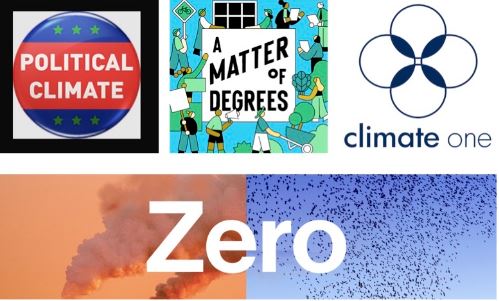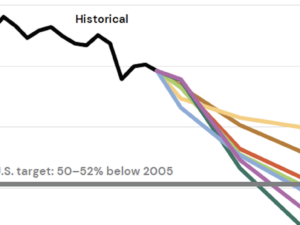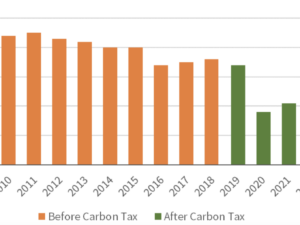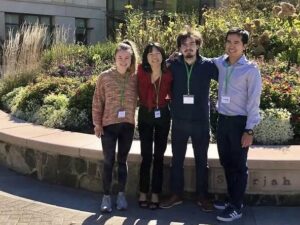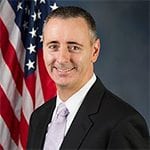Podcasts offer deeper dive into climate issues
By Steve Valk
For well-informed climate advocates who want to go beyond the headlines and dig deeper into the issue, podcasts can help quench their insatiable appetite for knowledge, and there is no shortage of podcasts available now that examine climate change through the lens of science, policy and politics. To get you started, here are a half dozen recommendations:
A Matter of Degrees
Season 3 of this documentary style podcast launched last month with a three-part series that answers the frequently-asked question about climate change: “What can I do?” After checking out several episodes, it’s easy to see why “A Matter of Degrees” has landed on numerous lists of climate podcasts worth listening to. The show’s quality should come as no surprise, considering its hosts. Leah Stokes, an Assistant Professor of Environmental Politics at UC Santa Barbara, was recently named to the TIME100 Next list of rising stars from across industries and around the world. Katharine Wilkinson is the author of several books, including Drawdown and All We Can Save and is the co-founder and executive director of the All We Can Save Project. Be sure to check out previous seasons. In particular, “The Devious Plan to Keep Us Hooked on Fossil Gas” reveals the somewhat underhanded ways that natural gas providers are pushing back on community efforts to electrify appliances. Another episode, “The Win-Win-Win Strategy to Retire Coal,” looks at the problem of coal-fired power plants that have to keep operating to pay off the enormous debt that utility operators have taken on and how to solve that problem.
Political Climate
Looking for something a little more timely that explores the “why?” and the “how?” of climate-related stories in the news? “Political Climate,” which occupies the space at the intersection of policy and politics, might be the podcast for you. This summer, the passage of the Inflation Reduction Act, the biggest U.S. investment ever in clean energy, quickly became the hot topic in the climate community. Throughout the month of August, Julia Pyper and her cohosts dug into the landmark legislation with a series of episodes about the political roller coaster that led to its passage in the Senate, how the IRA will give a huge boost to clean energy innovation and American competitiveness, and how the IRA can help Americans decarbonize our economy by electrifying their appliances. Pyper, who works in clean energy financing and is a senior fellow at the Atlantic Council’s Global Energy Center, moderates a conversation from a broad range of political perspectives with co-hosts Brandon Hurlbut, an Obama Administration alum, and Shane Skelton, who previously worked for Republican House Speaker Paul Ryan as an energy policy advisor.
Zero
Getting to net zero greenhouse gas emissions by 2050 is one of the biggest challenges facing humanity this century, and Bloomberg reporter Akshat Rathi has just launched a podcast looking at the people, policies and technologies working to achieve that goal. Innovation, developing and bringing to scale decarbonization technologies that do not yet exist, will be essential in net zero efforts once we get past the low-hanging fruit of existing technologies like solar and wind. In one episode, Rathi talks to Gabriel Kra of Prelude Ventures about the role of venture capitalists in helping start-ups with potential in the innovation space. In another episode, Rathi looks at what can be done to decarbonize the steel industry, a sector responsible for roughly 7% of the world’s greenhouse gas emissions. He came across a company, Electra, that is working on a process to make iron from iron ore, where 90% of emissions come from in steel making, that uses electricity rather than heat from coal. If you really want to get into the weeds, this podcast may be for you.
Climate One
Presented by The Commonwealth Club and hosted by Greg Dalton, Climate One is a weekly podcast that also airs on 60 public radio stations around the country. The show is often an extended conversation about the latest climate-related news. Depending on the subject, host Dalton engages a stellar lineup of guests each week who can break things down to give listeners a better understanding of the topic. A recent episode around the time of hurricanes Fiona and Ian, for example, examined the impact of climate change on the insurance industry. Urban sociologist Junia Howell explained how disaster aid actually increases inequity, and author Carolyn Kousky pointed out how the slow payouts on insurance claims worsen the already-dire circumstances of disaster victims. The latest episode looked at whether climate change could be a pivotal issue in the midterm elections, turning to Nathaniel Stinnett at Environmental Voter Project, Chelsea Henderson at RepublicEn and reporter Jean Chemnick at E&E News. The lively, conversational tone of the show keeps things moving and holds the listener’s attention.
Outrage + Optimism
The name Christiana Figueres should be familiar to most climate advocates. Between 2010 and 2016 she was Executive Secretary of the UN Framework Convention on Climate Change, presiding over the international climate conference that established the Paris Agreement on Climate Change. A founding partner of Global Optimism, she hosts Outrage + Optimism along with Tom Rivett-Carnac and Paul Dickinson. As the name suggests, the show provides a healthy dose of inspiration for those who wonder how we’re going to solve the climate crisis. The podcast has featured some pretty heavyweight guests — Greta Thunberg, David Attenborough, Michael Mann, and many others you may not yet know but ought to. Now in its sixth season, the show’s latest episode — “Australia is Back!” — goes Down Under, where a change in government is raising expectations that Australia, for years a laggard on climate action, is about to reach a turning point in the clean energy transition. A nice feature of the show’s website is that when you go to the “Browse” tab, you can filter episodes by topic: science, policy, justice, food, energy, etc.
Citizens’ Climate Radio
A project of Citizens’ Climate Education, the podcast posts monthly episodes hosted by Peterson Toscano, who presents a tight, 30-minute show that uses a story-telling format to feature someone in the climate movement. Each episode also offers a quick profile of an artist whose work relates to climate change and good news of the month in the climate world. Recent episodes have covered a young conservative’s work on climate solutions, helping climate advocates build personal resilience, how climate change affects people in the LGBTQ+ community, and the impact of climate change on domestic and wild animals in South Africa.

